

DrEoinCl : The UK Government have handed ... BT and Talk Talk lose file-sharing appeal. 6 March 2012Last updated at 06:37 ET BT and Talk Talk say the Digital Economy Act risks infringing user privacy BT and Talk Talk have lost an appeal over controversial measures to tackle copyright infringement online.
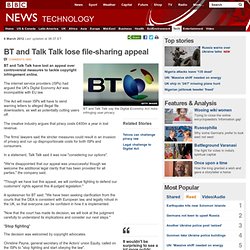
The internet service providers (ISPs) had argued the UK's Digital Economy Act was incompatible with EU law. The Act will mean ISPs will have to send warning letters to alleged illegal file downloaders, as well as potentially cutting users off. The creative industry argues that piracy costs £400m a year in lost revenue. The firms' lawyers said the stricter measures could result in an invasion of privacy and run up disproportionate costs for both ISPs and consumers. In a statement, Talk Talk said it was now "considering our options". Digital Economy Act's anti-piracy measures is delayed.
26 April 2012Last updated at 08:08 ET The Digital Economy Act seeks to curb rising rates of online piracy The controversial piracy law, the Digital Economy Act, has again been delayed, the Department for Culture, Media and Sport has confirmed.
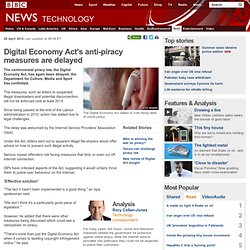
The measures, such as letters to suspected illegal downloaders and potential disconnection, will not be enforced until at least 2014. Ofcom to review site-blocking in Digital Economy Act. The government has asked Ofcom to review proposals in the Digital Economy Act that aim to combat piracy by having ISPs block access to websites used for copyright infringement.
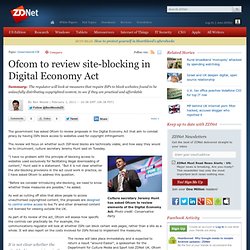
The review will focus on whether such ISP-level blocks are technically viable, and how easy they would be to circumvent, culture secretary Jeremy Hunt said on Tuesday. Culture secretary Jeremy Hunt has asked Ofcom to review elements of the Digital Economy Act. Photo credit: Conservative Party "I have no problem with the principle of blocking access to websites used exclusively for facilitating illegal downloading of content," Hunt said in a statement. "But it is not clear whether the site-blocking provisions in the act could work in practice, so I have asked Ofcom to address this question. "Before we consider introducing site-blocking, we need to know whether these measures are possible," he added. Home Office sets out plan to block websites. The government is considering a national blocklist to prevent people in state-funded networks from accessing websites that promote Islamic fundamentalism and other extremist views.
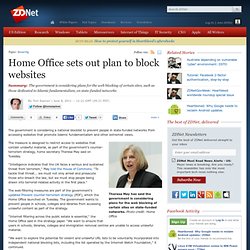
Theresa May has said the government is considering plans for the web blocking of certain sites on state-funded networks. Photo credit: Home Office. Government drops web blocking plans following Ofcom review. Proposals for blocking copyright infringement sites was a core part of the Digital Economy Act (sections 17 and 18) with the aim of reducing the amount of copyright infringement in the United Kingdom.
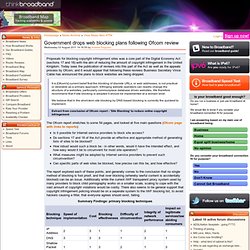
Today sees the publication of reviews into this part of the Act as well as the appeals process by Ofcom, and it would appear that following these reviews Business Secretary Vince Cable has announced the plans to block websites are being dropped. It is [Ofcom's] current belief that the blocking of discrete URLs, or web addresses, is not practical or desirable as a primary approach. Infringing website operators can readily change the structure of a websites, particularly commonplace database driven websites. The Ofcom report stretches to some 54 pages, and looked at five main questions (Ofcom page with links to reports): Is it possible for Internet service providers to block site access?
Summary Findings: primary blocking techniques1 = Worst, 3 = Best. Lib Dems to change their amendment to the digital economy bill. The Liberal Democrats are preparing to change their controversial amendment to the digital economy bill, which has its third and final reading in the House of Lords on Monday.
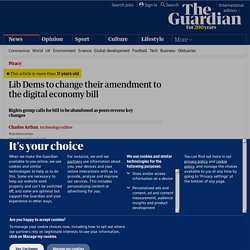
The change would give sites blocked under the bill the power to challenge it in the courts, and to demand legal costs and damages from any copyright owner that caused it to be wrongly blocked through court procedings. But the Open Rights Group, which campaigns on digital rights and freedoms, said that the amendment would not solve deeper problems with the bill – which may be rushed into law with barely any debate in the Commons – and called for it to be abandoned.
Digital Economy Bill: An ISP perspective. As a general principle and in support of the rule of law, nobody involved in the campaign process against the implementation of the Digital Economy Bill (DEB) supports the theft of someone else's property as is the case when downloading a pirate copy of a music track.
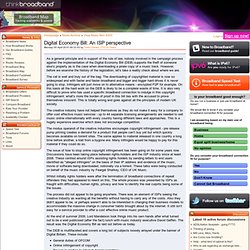
However, before we examine the history of the legislation, let's take a reality check about where we are. The cat is well and truly out of the bag. The downloading of copyrighted material is now so widespread and with faster and faster broadband and bigger and bigger hard drives it is never going to stop. Infringers will just move on to alternative means - encrypted P2P for example. On this basis all the hard work on the DEB is likely to be a complete waste of time. The modus operandi of the creative industries encourages copyright infringement - pre release pump priming creates a demand for a product that people can't buy yet but which quickly becomes available on torrent sites.
Amendment 120A. Documents show the Digital Economy Act was a done deal all along. A FREEDOM OF INFORMATION RESPONSE has revealed that Lord Mandelson had decided to approve the Digital Economy Act before public consultations had concluded, showing that there was absolutely no interest in seeing what the public had to say.
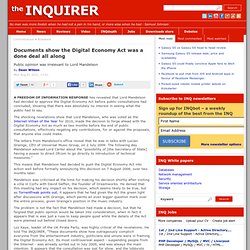
Media Talk podcast: Digital economy bill, Bebo, and Rupert Murdoch. Matt Wells is joined by Maggie Brown and Steve Ackerman from Somethin' Else for this week's Media Talk podcast.
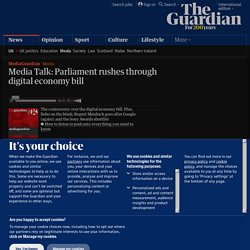
We begin in Westminster with the digital economy bill. Two years in the making, but passed after just two hours of debate in the House of Commons as part of the parliamentary wash-up - we pick apart this scandalous and wide-ranging piece of legislation. Labour MP Tom Watson tells us why he voted against the government. Be advised, though, that his phone died before we could get onto anything too juicy. That's showbusiness for you (and politics). Also in the podcast, Bebo gets the bullet as AOL declares it willl shut down or sell its failing social networking site. Plus, Rupert Murdoch's gone ga-ga over Google - again. Finally, we give our verdict on Matt Smith as the new Doctor Who, and peer at the nominees for this year's Sony Awards – including this very podcast (we're very flattered).